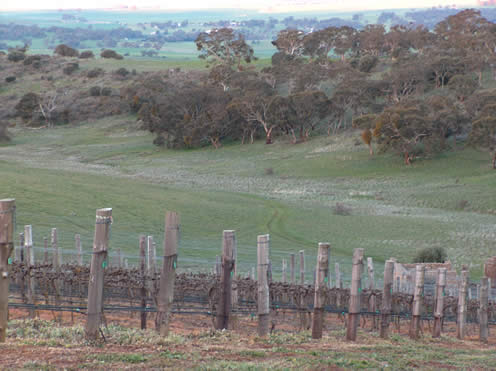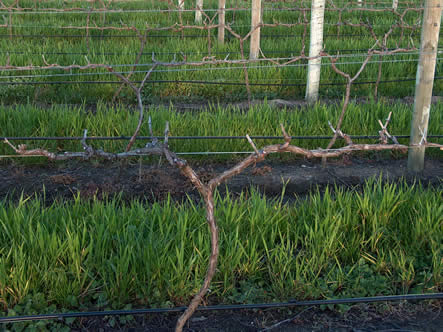|
The
Clare Valley
Part
2: Jeffrey Grosset

Jeffrey Grosset (pictured above in his Polish Hill
vineyard) has achieved fame as the producer of Australiaís most
celebrated Rieslings. I was anxious to meet him on my visit to the
Clare, but unfortunately this coincided with the first weekend
opening of his cellar door, plus a visit by family. Most producers
would have used these as quite legitimate excuses to tell me Iím
out of luck. Letís face it, heís someone who has no trouble
selling his wine, and Iím a low-ranking journo who isnít going
to contribute much to his bottom line. His loyalty quite clearly,
and appropriately, lies with his customers, but Jeffrey pulled out
all the stops to avoid leaving me feeling unwelcome. In the end, the
only way I could meet up with him was to show up at the cellar door
with the regular punters, which I was glad to do.
I arrived mid afternoon after a scoot round the
vineyards of Clare, and taste the wines, asking questions but
backing off to give him space when his customers arrive. Towards the
end of the tasting, all becomes quiet. Thatís it for the day, so a
couple of phone calls later Jeffrey is free to show me round his
vineyards. A stroke of luck.
| The discussion we have is wide ranging; heís a very
thoughtful sort of guy, with well reasoned and quite strongly
held opinions. A familiar Grosset theme is that of ownership.
Who owns a name? Jeffrey is keen that names of places
shouldnít be locked in and owned by people. Yet heís
understandably a little miffed that a name he has made famous
with one of his wines, Polish Hill (from a vineyard in Polish
Hill River Valley in Clare), is now being used by others as a
marketing tool. I guess it works both ways. |

The spectacular Gaia
vineyard, stuck out on its own in the rolling high country of
Clare, pictured in the evening twighlight. It's a five acre,
east-facing site, red soil over red rock that Grosset
describes as a soft slate. The land belongs to a friend of
Grosset who owns 6500 acres, all above 500 metres high. |
We also spend some time discussing the Australian Closure Fund which
Grosset has just established. It's designed to encourage research
into the science of sealing wine bottles. In particular, is oxygen
transmission through the closure needed for successful ageing of
reds?
And the wines? The two Rieslings are fantastic,
although a little tight at this early stage in their lives. Jeffrey
crushes after destemming and sells off the pressings, because these
have a higher phenolic content. Whole bunch pressing has it
advocates, but a problem is that itís then hard to get a clean
break between the free-run and press juice. Iím also a big fan of
the Gaia, which is a serious red wine of great appeal.
Grosset Polish Hill Riesling 2004
Of Grossetís two Riesling sites this is higher up, with soils
that are sandy shales. It is very aromatic and tight with lean,
limey character. The palate is concentrated, fresh and bright with
lots of minerally notes. Great depth to this brilliant Riesling.
Very good/excellent 92/100

Riesling, Polish Hill
Grosset Watervale Riesling 2004
From red soils over limestone. More floral, limey nose. The
palate is crisp and lean with bright fruit and good acid. Thereís
almost a spiciness to the minerally finish. Very fresh and bold with
good depth. Very good/excellent 91/100
Grosset Semillon/Sauvignon Blanc 2004
Very intense, herby grassy nose is quite refined and rather
lean. The palate is crisp, grassy and shows lovely natural acidity.
Delicious savoury white with great intensity. Very good/excellent
90/100
Grosset Picadilly Chardonnay 2003 Adelaide Hills
Fermented and aged in French oak, half of which is new. 40% goes
through malolactic fermentation. Creamy, toasty, bready nose is
elegant but distinctly oaky. The palate is savoury and bready with
good length. Quite a restrained style with a strong oak imprint.
Very good/excellent 90/100
Grosset Pinot Noir 2003 Adelaide Hills
Lots of care goes into this wine. The vines were planted in 1982
in a cool bit of the Adelaide Hills. Grapes are crushed by feet and
the wine is left on lees for a year; 60% new oak is used. The nose
is quite sweet with cherryish, herbal fruit and a sort of sweet and
sour character. The fresh, savoury palate has lovely expressive
cherryish fruit and a nice sort of sourness (doesnít sound nice,
but it works). Juicy and quite primary, but elegant and nicely
structured. Very good+ 88/100
Grosset Gaia 2002
From a single vineyard high up in the hills. Lovely intense
blackcurranty fruit on the nose, which is pure and has a nice
savoury spicy edge. The palate shows cool-climate elegance to the
fruit Ė bright and pure with a minerally edge and a spicy finish.
A really wonderful wine. Very good/excellent 93/100
Back
to top
|

